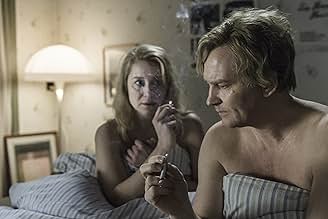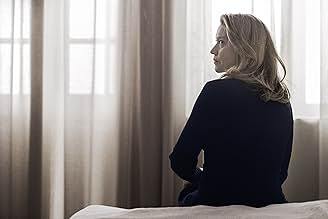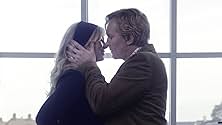PUNTUACIÓN EN IMDb
6,4/10
8,5 mil
TU PUNTUACIÓN
Una historia sobre el conflicto entre los deseos personales, la solidaridad y la tolerancia en una comuna danesa en la década de los setenta.Una historia sobre el conflicto entre los deseos personales, la solidaridad y la tolerancia en una comuna danesa en la década de los setenta.Una historia sobre el conflicto entre los deseos personales, la solidaridad y la tolerancia en una comuna danesa en la década de los setenta.
- Dirección
- Guión
- Reparto principal
- Premios
- 6 premios y 21 nominaciones en total
Reseñas destacadas
"The Commune" at the center of Thomas Vinterberg's film isn't typical of the communes I knew back in the day. For a start, the members of this one are reasonably well off and are mostly middle-aged and, of course, they bring to this 'living together' thing all the baggage you would expect. Things come to a head when commune founder Erik, (Ulrich Thomsen), falls for one of his students and moves her in leading his wife Anna, (Trine Dyrholm), to have a nervous breakdown.
Vinterberg's film began life as a play and it's certainly very theatrical but despite the emotional conflicts at the film's heart, it's also fairly conventional with everyone other than Erik and Anna fading very much into the background. You never get to know any of them. Subplots come and go and it just trudges on. On the plus side, it's very well acted particularly by Dyrholm who won the Best Actress prize at Berlin; she's the only one you actually care about. It might have worked better on stage where at least you could feel 'in the same place' as these commune-dwellers. On screen, it just feels like another piece of Vinterberg navel-gazing.
Vinterberg's film began life as a play and it's certainly very theatrical but despite the emotional conflicts at the film's heart, it's also fairly conventional with everyone other than Erik and Anna fading very much into the background. You never get to know any of them. Subplots come and go and it just trudges on. On the plus side, it's very well acted particularly by Dyrholm who won the Best Actress prize at Berlin; she's the only one you actually care about. It might have worked better on stage where at least you could feel 'in the same place' as these commune-dwellers. On screen, it just feels like another piece of Vinterberg navel-gazing.
This is quite a slow burner, plot pace wise. Its mostly about family dynamics and trust. It took a while for me to feel especially interested in the characters but I thought it was somewhat of a powerful watch by the time it headed towards the end and I would say it may make you think.
If your not keen on character focussed dramas then this won't be for you. Also of course you likely have to rely on the subtitles, as its in Danish, although I was pleased to see that the subtitles were quite large in terms of text size, compared to other films with smaller subtitles, so if anything it was slightly less of an issue than it might have been. I felt sorry for the wife Anna and I did find myself wondering what might happen next, as things moved on plot wise but it is, as I say, a relatively slow burner, so don't expect fast paced action or anything of that sort. Its a reasonably intriguing watch and overall I suppose I'd say its a good watch, hence my rating.
If your not keen on character focussed dramas then this won't be for you. Also of course you likely have to rely on the subtitles, as its in Danish, although I was pleased to see that the subtitles were quite large in terms of text size, compared to other films with smaller subtitles, so if anything it was slightly less of an issue than it might have been. I felt sorry for the wife Anna and I did find myself wondering what might happen next, as things moved on plot wise but it is, as I say, a relatively slow burner, so don't expect fast paced action or anything of that sort. Its a reasonably intriguing watch and overall I suppose I'd say its a good watch, hence my rating.
A middle class Danish couple find that they have inherited a rather grand house on the death of Erik's father. It is going to be too big for them and their only daughter and more over too hard to finance and so Anna suggests they invite a few others to live with them and for a 'Kollektivet' or as we would call it a commune.
They waste little to no time in getting an assorted array of waifs and not so strays and soon fine that communal living bring challenges and opportunities in equal measure. Not all of them are going to be easy to grasp and the tensions, that go hand in hand with any social experiment, waste no time in pushing their way to the fore.
Now I really liked this, I loved the idea of a commune having spent time in one in the eighties (when they were a bit passé to be honest) and the themes are explored here but also the lives of the main characters are mostly to the fore. This is Anna played brilliantly by Trine Dryholm – 'The Legacy' and her husband Erik (Ulrich Thomsen – 'The Blacklist') and their young daughter who is growing up much too quickly. His is from director Thomas Vinterberg who brought us 'The Hunt' in 2012 and 'The Celebration' in 1998 and I think he has an eye for style but sometimes struggles to engage, but here I think he has melded all parts of the art very well together to bring a very entertaining watch – recommended.
They waste little to no time in getting an assorted array of waifs and not so strays and soon fine that communal living bring challenges and opportunities in equal measure. Not all of them are going to be easy to grasp and the tensions, that go hand in hand with any social experiment, waste no time in pushing their way to the fore.
Now I really liked this, I loved the idea of a commune having spent time in one in the eighties (when they were a bit passé to be honest) and the themes are explored here but also the lives of the main characters are mostly to the fore. This is Anna played brilliantly by Trine Dryholm – 'The Legacy' and her husband Erik (Ulrich Thomsen – 'The Blacklist') and their young daughter who is growing up much too quickly. His is from director Thomas Vinterberg who brought us 'The Hunt' in 2012 and 'The Celebration' in 1998 and I think he has an eye for style but sometimes struggles to engage, but here I think he has melded all parts of the art very well together to bring a very entertaining watch – recommended.
The story is not a good study of characters. All of them are almost caricatures. When the existential problem between Erik and Ana arises, both behaves in a way too much elementary, taking in account the gravity of the situation which is going on. More precisely (1) Erik is absolutely incapable to realise that he is ruining the emotional life and the self respect of the woman with whom he has been married and living in a pleasant way during at least fifteen years. A woman who proved to be generous when she accepted that Emma could live with the community, and who had probably fantasies of living a ménage à trois, along with Erik and Emma, thing that I think reasonable and human, considering what was going on. Erik sticks with Emma as if he hadn't any responsibility with regard to Anna feelings. (2) Anna is incapable to react in time to rescue her dignity which is being hurt by the irresponsible behaviour of Erik. The rest of the characters manifest themselves very poorly with respect to the crisis between Erik an Anna. Except the young Freja, daughter of Erik and Anna which is the only one capable to say that her mother must leave the community and seek for a new life. In short, Erik who is almost a pivot of the whole story, behaves - in the light of existentialist philosophy - as an individual with bad faith. I would add also, on my part, that he is a kind of mediocre individual.
Vinterberg, understandably having grown up in a commune, doesn't properly establish the hippy commune lifestyle. Probably because to him, that's just what he grew up with. He assumes you already know (and I do) but most people don't (or haven't thought about it) so the film feels severely lacking in world building. If this movie were an essay the first paragraph with the hypothesis is missing. Tell us a little bit about the ideology behind the choice in lifestyle; you did it beautifully did with Druk! Without it, the dramatic, emotional and ideological arithmetic doesn't quite add up. Have Ole tells us a bit about his left wing literature! Not to mention, Vinterberg shares nothing of the drug culture that the hippy lifestyle so adamantly relies on. Squash any human instinct/desire with a physical simulation; that's the hippy way. Feel unhappy: drink. You don't get that spark from learning something new? Just take a smoke and you'll get that spark relearning things you already know. Everything is material for the hippy, everything superficial. Real emotions always denied because we have pills for that! This film severely lacked a proper set up of that world in the first half.
That being said, this film develops into a deeply pertinent and important message. He perfectly diagnoses the problems with a hippy approach to a family structure. And I know this because my own family was a victim of this way of life. The mom in the film is my mom. The dad is my dad. The people in the film are from 70s Denmark, and my parents are from 90s LA. And while we live miles apart, the way of thinking leads to the same outcomes, and I have to repeat: Vinterberg perfectly diagnoses the problem with this type of thinking. While the woman may be the one suggesting a free love lifestyle, it's ultimately the women who will always suffer. The patriarch is to blame because he is the leader, whether or not he rhetorically offloads his duty to others.
The institution of marriage protects women, as their prospects of love virtually become null and void once they become old and ugly. The man however can remarry. This is why marriage exists. My parents were stupid enough to never make this observation and like in the movie, my mom ended up hooked on pills and alcohol while my father ran off with his tight new muse. And if you think the corporate world has any interest in supporting old women, think again.
That being said, this film develops into a deeply pertinent and important message. He perfectly diagnoses the problems with a hippy approach to a family structure. And I know this because my own family was a victim of this way of life. The mom in the film is my mom. The dad is my dad. The people in the film are from 70s Denmark, and my parents are from 90s LA. And while we live miles apart, the way of thinking leads to the same outcomes, and I have to repeat: Vinterberg perfectly diagnoses the problem with this type of thinking. While the woman may be the one suggesting a free love lifestyle, it's ultimately the women who will always suffer. The patriarch is to blame because he is the leader, whether or not he rhetorically offloads his duty to others.
The institution of marriage protects women, as their prospects of love virtually become null and void once they become old and ugly. The man however can remarry. This is why marriage exists. My parents were stupid enough to never make this observation and like in the movie, my mom ended up hooked on pills and alcohol while my father ran off with his tight new muse. And if you think the corporate world has any interest in supporting old women, think again.
¿Sabías que...?
- CuriosidadesThe film is based on Thomas Vinterberg's play of the same name, which is inspired by his colourful childhood in an academic commune north of Copenhagen.
- PifiasThe signs on the bus stops were not introduced until the late 80's or 90's.
Selecciones populares
Inicia sesión para calificar y añadir a tu lista para recibir recomendaciones personalizadas
- How long is The Commune?Con tecnología de Alexa
Detalles
Taquilla
- Recaudación en Estados Unidos y Canadá
- 38.737 US$
- Fin de semana de estreno en EE. UU. y Canadá
- 9249 US$
- 21 may 2017
- Recaudación en todo el mundo
- 4.410.339 US$
- Duración
- 1h 51min(111 min)
- Color
- Mezcla de sonido
- Relación de aspecto
- 2.35 : 1
Contribuir a esta página
Sugerir un cambio o añadir el contenido que falta




























